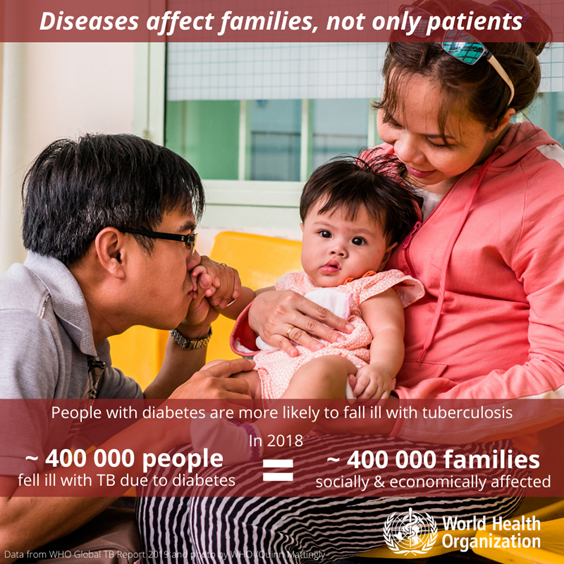
Diabetes has long been recognized as one of the key risk factors for the development of tuberculosis (TB) and the number of people living with diabetes has nearly quadrupled since 1980 to 422 million people, mainly in developing countries with the highest TB burden. In the latest WHO Global TB Report, diabetes was estimated to have caused around 400,000 people to fall ill with TB globally in 2018. Not only does diabetes increase the risk of TB, but people with diabetes have worse TB treatment outcomes, with a significantly higher likelihood of dying, treatment failure or recurrent TB. Similarly, TB can complicate the management of diabetes and worsen glycaemic control. Both conditions have substantial health and economic impact on both individuals and their families. To address the joint burden, WHO released the Collaborative Framework for Care and Control of Tuberculosis and Diabetes in 2011, however uptake of its recommendations has been slow.
Last year at the historic UN General Assembly high-level meeting on the Fight Against Tuberculosis in New York, Member States signed up to the Political Declaration that committed to developing community-based health services that also address related health conditions such as diabetes as part of prevention, diagnosis, treatment and care of TB. Similarly, through the Political Declaration of the third high-level meeting of the General Assembly on the prevention and control of non-communicable diseases, Member States committed to integrating responses to non-communicable diseases and communicable diseases, such as HIV/AIDS and tuberculosis, especially in countries with the highest prevalence rates.
“Strengthening collaboration, maximizing synergies to scale up integrated action across the disease programmes will be critical to achieve these commitments, while keeping the patients at the centre.” said Dr Tereza Kasaeva, Director of the Global TB Programme. “However, we also need to ensure that other sectors are on board to address the determinants of these two diseases and end the preventable suffering and deaths. As we mark World Diabetes Day, I would urge countries and stakeholders to consider what more we can do more in the coming year to ensure that integrated action on TB and diabetes is firmly on the agenda and incorporated within upcoming plans.”
Dr Cherian Varghese, Acting Director, WHO Department of Non Communicable Diseases added “Households often suffer catastrophic expenditures related to treatment of diabetes and its complications as well as diseases like TB. Universal health coverage for essential diabetes care and TB can help reduce economic hardship and save lives”.
